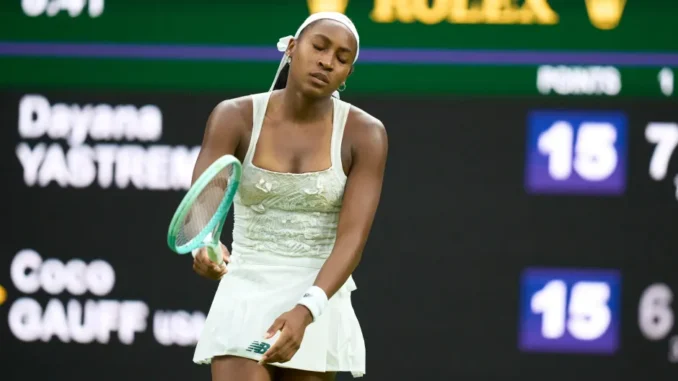
The grass courts of Wimbledon, steeped in tradition and prestige, delivered a crushing blow to American tennis hopes on the second day of the 2025 Championships. Coco Gauff, the world No. 2 and reigning French Open champion, suffered a stunning first-round defeat to Ukraine’s Dayana Yastremska, falling 7-6(3), 6-1 under the roof of No. 1 Court. The loss, one of the biggest upsets of the tournament, sent shockwaves through the tennis world and reignited questions about whether American tennis has found its next true superstar. Gauff’s tearful exit, marked by raw emotion and candid reflection, underscored both her immense potential and the challenges she faces on grass, leaving fans and analysts pondering the state of the sport in the U.S.
At just 21, Gauff has been a beacon of hope for American tennis since her breakout in 2019, when, at 15, she stunned Venus Williams at Wimbledon to reach the fourth round. Her meteoric rise, fueled by a 2023 US Open title and a 2025 French Open triumph, has drawn comparisons to legends like Serena Williams. Yet, her latest Wimbledon defeat—her second first-round exit at the All England Club in three years—highlighted a persistent struggle on grass. “I don’t know, I just feel a little bit disappointed in how I showed up today,” a tearful Gauff said post-match, her voice heavy with frustration. “I feel like mentally I was a little bit overwhelmed with everything that came after [the French Open]. I didn’t feel like I had enough time to celebrate and also get back into it.”
The match against Yastremska, ranked No. 42, was a brutal test from the start. The Ukrainian, fresh off a final in Nottingham and a quarterfinal in Eastbourne, wielded her forehand with lethal precision, skidding shots across the slick grass to exploit Gauff’s vulnerabilities. Gauff, known for her defensive prowess and relentless fight, struggled to find rhythm, especially on serve. She managed only 45% of first serves in play, racking up nine double faults, including two critical ones in the first-set tiebreak. Yastremska, by contrast, was “on fire,” as she put it, slamming 16 winners to Gauff’s mere six. “Playing against Coco, it is something special,” Yastremska said, noting their 3-1 head-to-head now favoring Gauff but celebrating her biggest career win. “I love playing on grass. I feel like this season we are friends.”
Gauff’s defeat was part of a broader wave of upsets, with No. 3 seed Jessica Pegula also falling to Elisabetta Cocciaretto 6-2, 6-3. “I don’t think I was playing bad,” Pegula said, echoing Gauff’s sentiment of disbelief. The early exits of two top American women marked a historic low, as it was the first time in the Open Era that two of the top three seeds lost in the first round of a major. For Gauff, the loss was particularly stinging, as she became only the third woman in the Open Era to exit Wimbledon in the first round after winning the French Open, joining Justine Henin (2005) and Francesca Schiavone (2010). The transition from clay to grass, a challenge even for greats like Serena Williams, who last achieved the Channel Slam in 2015, proved too steep for Gauff this year.
The pressure on Gauff has been immense since her 2019 Wimbledon debut, where “Cocomania” captivated the world. Her versatility—evident in her 10 WTA singles titles, including the 2024 WTA Finals, and nine doubles titles—has made her a household name. Yet, grass remains her kryptonite, with a 65% win rate compared to 70% on other surfaces. “I think it’s just changing my playing style a little bit, which is difficult,” Gauff admitted, acknowledging the need for a more aggressive approach on grass. Her pre-tournament goal was modest: to surpass her previous fourth-round best at Wimbledon. “I would love to win this, but I’m a big believer in just conquering one step at a time,” she said, a mindset shaped by years of navigating sky-high expectations.
This defeat, while painful, is unlikely to derail Gauff’s trajectory. Her resilience, honed through setbacks like a 2023 Wimbledon first-round loss to Sofia Kenin, suggests she’ll regroup for the hard-court season, with the US Open looming as a prime opportunity. “I’m not going to dwell on this too long because I want to do well at US Open,” she said, already looking ahead. Yet, her exit serves as a sobering reminder for American tennis, which has produced stars like Billie Jean King and the Williams sisters but now seeks a definitive successor. Gauff, with her poise, power, and passion, remains the closest contender, but her Wimbledon struggles highlight the gap between potential and dominance. As the tournament continues without her, the question lingers: can Gauff—or any American—rise to fill the superstar void?
Leave a Reply